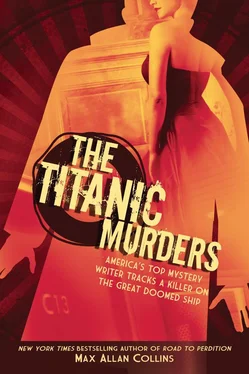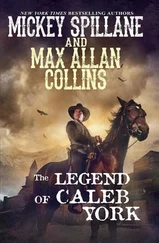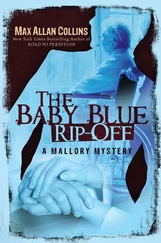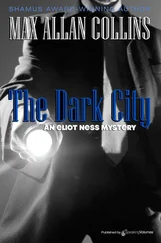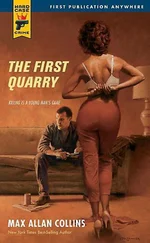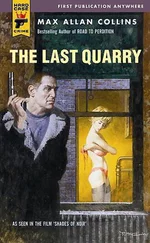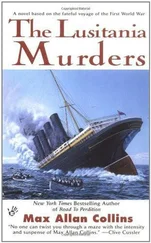Max Collins - The Titanic Murders
Здесь есть возможность читать онлайн «Max Collins - The Titanic Murders» весь текст электронной книги совершенно бесплатно (целиком полную версию без сокращений). В некоторых случаях можно слушать аудио, скачать через торрент в формате fb2 и присутствует краткое содержание. Жанр: Исторический детектив, на английском языке. Описание произведения, (предисловие) а так же отзывы посетителей доступны на портале библиотеки ЛибКат.
- Название:The Titanic Murders
- Автор:
- Жанр:
- Год:неизвестен
- ISBN:нет данных
- Рейтинг книги:5 / 5. Голосов: 1
-
Избранное:Добавить в избранное
- Отзывы:
-
Ваша оценка:
- 100
- 1
- 2
- 3
- 4
- 5
The Titanic Murders: краткое содержание, описание и аннотация
Предлагаем к чтению аннотацию, описание, краткое содержание или предисловие (зависит от того, что написал сам автор книги «The Titanic Murders»). Если вы не нашли необходимую информацию о книге — напишите в комментариях, мы постараемся отыскать её.
The Titanic Murders — читать онлайн бесплатно полную книгу (весь текст) целиком
Ниже представлен текст книги, разбитый по страницам. Система сохранения места последней прочитанной страницы, позволяет с удобством читать онлайн бесплатно книгу «The Titanic Murders», без необходимости каждый раз заново искать на чём Вы остановились. Поставьте закладку, и сможете в любой момент перейти на страницу, на которой закончили чтение.
Интервал:
Закладка:
“You… you’re not going to…”
“Turn you in? No. I don’t know that what you did was right, Mr. Navatril, but I do know you love your boys… and I’m convinced you didn’t kill John Crafton.”
“I would have liked to.”
“An understandable sentiment… Good luck to you.”
And the two men again shook hands.
His manner considerably warmer, Navatril walked Futrelle back to the Second-Class Dining Saloon, where father rejoined sons and Futrelle rejoined Andrews.
“Did you do what you needed to?” Andrews asked as they headed out.
“Yes.”
“No difficulties?”
“Nothing much.”
By the time the two formally attired men wound their way through the galley, on the return trip, the hectic pace of the expansive kitchen had slowed into the cleanup phase, the execution of culinary arts replaced with the mundane reality of dishwashing, storage and garbage disposal. And in the now cavernously empty First-Class Dining Saloon, tables were being set anew with linen and china and silverware.
At the Grand Staircase beyond the Dining Saloon, Andrews disappeared with a nod, probably heading up to his stateroom, while Futrelle made his way into the spacious reception room, where the nightly concert was under way.
Like the two dining saloons, the reception room extended the width of the ship, yet for an area so expansive (over fifty feet in length, Futrelle guessed), the effect was of intimacy-the white-paneled walls so exquisitely carved in low relief, soft glowing lighting, the rich Axminster carpet, the casual cane chairs, the occasional luxurious Chesterfields, the round cane tables for parties of four amidst lazily leaning palms sprouting from an abundance of pots.
Violinist Wallace Hartley’s quintet was clustered about the grand piano (there was no stage), playing a medley of numbers from Offenbach’s The Tales of Hoffmann, which seemed ironically fitting to Futrelle, considering the tale he’d just heard from “Hoffman.” The little orchestra was quite good at light classical-Puccini, Dvorak, Bizet-and late in the evening an area might be cleared for some informal dancing to ragtime, primarily by the younger passengers, struggling to perform that latest dance, the fox-trot, to a drummerless orchestra with no fox-trots in their repertoire.
Futrelle joined May and the Harrises at a little table near a window onto the serene ocean under a clear starless sky; faintly, ever so faintly, the thrum of the ship’s motion could be perceived, like a gentle counterpoint under the main melody. The “concert” was informal, and muted conversation was common, as stewards circulated with coffee and tea, and scones (in the unlikely event anyone had saved room).
“She’s a pretty girl,” Henry was saying.
“Don’t get any ideas, Henry B.,” Rene said, kidding him on the square. She looked pretty herself in a green silk organdy evening gown with a diamond tiara trimmed with bird-of-paradise feathers.
“Who’s a pretty girl?” Futrelle asked, settling into his chair.
“Dorothy Gibson,” May explained. His wife looked especially comely tonight, in her cream silk-satin evening dress, her hair up, no hat. “Young cinema actress Henry and Rene met on the boat deck, this afternoon.”
“Brazen little thing,” Rene said, rolling her eyes. “She came up and introduced her self. ” This seemed to Futrelle an amusing judgment coming from such a modern, self-assertive woman.
“She has your typical obnoxious stage mother,” Henry said, “who normally I couldn’t abide. But this girl, Dorothy, has a, uh… business relationship with Jules Brulatour, the film distributor.”
“Business relationship,” Rene said. “That’s a new word for it.”
“Anyway,” Henry said, “I’m offering her a part in my next Broadway production.”
“I hope she can talk,” May said.
Henry waved that off. “With her looks she doesn’t have to… and with her connections, I’ll be making my own cinematographs before the year’s out.”
“You’re convinced these moving pictures are the future,” Futrelle said, shaking his head.
“The future is here and now, Jack. And I’m gonna be looking for snappy stories… if you should happen to know of any good writers.”
“Nobody comes to mind,” Futrelle said, and as he nodded to a steward that he would indeed like his coffee cup filled, the mystery writer noticed Ben Guggenheim seated nearby, sharing a table for four with the lovely blonde Madame Pauline Aubert, stunning and shapely in her pink-beaded purple panne-velvet dinner dress.
Guggenheim’s was an odd shipboard situation; the renegade member of the iron-smelting dynasty, now in his dapper late forties, was not shunned exactly, and due to his station, he was treated respectfully. Futrelle had seen the Astors stop and chat with him just before dinner, and Maggie Brown appeared to be an old friend, possibly dating to Guggenheim’s mining days in Colorado.
But no one sat with Guggenheim and his lovely lady in the reception room. The blue-eyed, fair-skinned, slightly plump, prematurely gray millionaire was, after all, Jewish, and the Jewish tended to sit together, by choice, or in the case of the dining saloons, by White Star’s prearrangement. And could anyone imagine that model of married life, the conservative Strauses-Guggenheim’s nearest social equivalent-sitting with a man and his mistress?
The little orchestra completed their Tales of Hoffmann medley, to much applause, and had begun playing the haunting “Songe d’Automne,” when Guggenheim rose, patting his lovely companion on the shoulder and exchanging smiles with her, then heading out of the room.
Futrelle leaned in and whispered to May, “I need to talk to Guggenheim, and he’s ducking out for a smoke or something.”
She gave him a mischievous smile. “Shall I pay my compliments to Madame Aubert?”
“That would be awfully gracious of you, dear…. Let’s both see what we can find out.”
EIGHT
Futrelle caught up with Guggenheim stepping onto the elevator, behind the Grand Staircase; the uniformed attendant waited as the mystery writer stepped aboard.
Guggenheim smiled at him, nodding, saying in a fluid baritone, “The boys play well enough, but I felt the call of a cigar.”
“I heard a similar siren song for a cigarette,” Futrelle said. “Mind if I tag after?”
“I’d enjoy the companionship.” To the elevator attendant, Guggenheim said, “A deck, if you please…. You’re Futrelle, aren’t you, the detective-story writer? Jacques Futrelle?”
It was then that Futrelle realized Guggenheim was mildly intoxicated-not falling-down drunk by any means, but the man had clearly not stinted on the wine during dinner, or perhaps an after-dinner brandy (or three) had done it.
“That’s right. But I prefer Jack.”
“Pleasure, Jack.” The millionaire offered his hand, which bore several jeweled rings, a diamond here, a ruby there. “Ben Guggenheim.”
They shook, and Futrelle said, “Is this elevator one of yours?”
Guggenheim, pleasantly surprised by Futrelle’s question, said, “Why, no-I do business with White Star, but thus far they’ve not done business with me.”
Futrelle had read a newspaper article about Guggenheim’s new company, International Steampump, building the elevators at the Eiffel Tower.
“Sporting of you to give them your business, then,” Futrelle said.
Guggenheim chuckled. “No choice-all the Cunard liners out of Paris were delayed because of the damned stokers’ strike.”
Soon they were poised at the rail of the open portion of the promenade, Guggenheim indulging himself with a Havana, Futrelle lighting up a Fatima. Stars seemed to have been flung like diamonds against the black velvet of the sky; brilliant as they were, the stars cast no reflection on the obsidian waters, far below. The cold was bracing and a pleasant contrast to the intake of tobacco smoke.
Читать дальшеИнтервал:
Закладка:
Похожие книги на «The Titanic Murders»
Представляем Вашему вниманию похожие книги на «The Titanic Murders» списком для выбора. Мы отобрали схожую по названию и смыслу литературу в надежде предоставить читателям больше вариантов отыскать новые, интересные, ещё непрочитанные произведения.
Обсуждение, отзывы о книге «The Titanic Murders» и просто собственные мнения читателей. Оставьте ваши комментарии, напишите, что Вы думаете о произведении, его смысле или главных героях. Укажите что конкретно понравилось, а что нет, и почему Вы так считаете.
